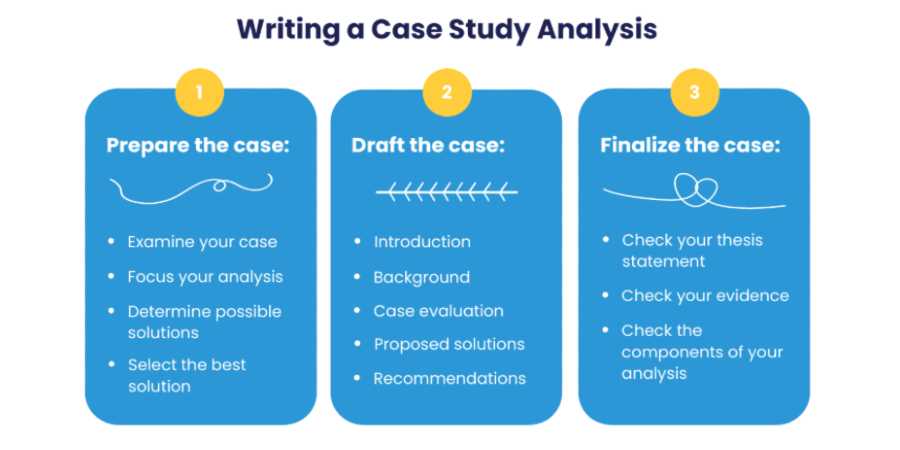Case study analysis is a common assignment in business management, designed to teach students how to assess real-world situations and identify challenges, as well as train them in developing efficient strategies to achieve desired outcomes.
It’s understandable that many students feel intimidated when required to analyze a case study and propose a solution, especially when it involves actual scenarios. However, writing a case analysis paper isn’t as difficult as it might seem. Continue reading this article to discover helpful case study examples and expert tips from Custom-writing professionals to guide you through the process!
👣 Case Study Analysis Writing Guide: 3 Steps
Business management is built on case analysis. Every single economic result shows that the methods and instruments employed were either well-timed and expedient, in the event of success, or not, in case of failure. These two options indicate whether the strategy is efficient (and should be followed) or requires corrections (or complete change). Such an approach to the case study will make your writing piece more proficient and valuable for the reader.
Crafting an in-depth case study requires thorough preparation and attention to detail at each step. It’s okay if you find this challenging or simply need guidance – consider using our case study writing service. Our team of experts will ensure your paper meets academic standards and delivers maximum insights in the field. Let us help you turn your case study into a remarkable piece of work!
The following steps will direct your plan for writing a case study analysis.
Step 1: Preliminary work
- Critical reading of the case
- Make notes and highlight the numbers and ideas that could be quoted.
- Focusing the analysis
- Single out as many problems as you can, and briefly mark their underlying issues. Then make a note of those responsible. In the report, you will use two to five of the problems, so you will have a selection to choose from.
- Brainstorming the solutions
- Outline a possible solution to each of the problems you found. Course readings and outside research shall be used here. Highlight your best and worst solution for further reference.

Step 2: Drafting the Case
- Executive Summary (= Introduction + Background)
- Provide a general description of the situation and its history.
- Name all the problems you are going to discuss.
- Specify the theory used for the analysis.
- Present the assumptions that emerged during the analysis, if any.
- Case Evaluation
- Describe the detected problems in more detail.
- Indicate their link to, and effect on, the general situation.
- Explain why the problems emerged and persist.
- Proposed Solutions
- List realistic and feasible solutions to the problems you outlined, in the order of importance.
- Specify your predicted results of such changes.
- Support your choice with reliable evidence (i.e., textbook readings, the experience of famous companies, and other external research).
- Recommendations
- Define the strategies required to fulfill your proposed solution.
- Indicate the responsible people and the realistic terms for its implementation.
- Recommend the issues for further analysis and supervision.
Step 3: Finalizing the Case
Like any other piece of writing, a case analysis requires post-editing. Carefully read it through, looking for inconsistencies and gaps in meaning. Your purpose is to make it look complete, precise, and convincing.
- Proofread for grammar, spelling, and formatting errors.
- Verify the accuracy of your data and references.
- Seek feedback from peers or mentors if possible.
- Ensure your recommendations are actionable and realistic.
🔬 Analyzing the Case
It would be best if you also learned how to analyze a case study. Once you have read through the case study, you need to determine the focus of your analysis. You can do this by doing the following:
- Identify the main research problem (e.g., the loss of brand identity as a problem faced by Starbucks).
- Analyze the main underlying causes of the existing problem:
- When and why did Starbucks lose its brand identity?
- Were there certain changes in the company’s strategy before the problem occurred?
- Establish the cause-and-effect relations between the various factors. Starbucks’ brand image – possible sources of influence:
- The inner vision of the company.
- Advertising.
- The design of the stores.
- Formulate the best solutions to address the problem.
- Paying more attention to advertising campaigns.
- Reconsidering the vision and mission statements.
- Improving the design of stores.
Once you’ve established the focus of your analysis, the next crucial step is to conduct research. Here, you need to support your findings and develop well-grounded recommendations. Effective research involves several key tasks:
- Gather hard, quantitative data (e.g. 67% of the staff participated in the meeting).
- Design research tools, such as questionnaires and surveys (this will aid in gathering data).
- Investigate similar cases or academic research to gain broader perspectives.
- Determine and suggest the best specific, workable solutions.
- Consider the potential consequences of your proposed solutions.
Compare your chosen solutions to the solutions offered by the experts who analyzed the case study you were given or to online assignments for students who were dealing with a similar task. The experts’ solutions will probably be more advanced than yours simply because these people are more experienced. However, don’t let this discourage you; the whole point of doing this analysis is to learn. Use the opportunity to learn from others’ valuable experience, and your results will be better next time.
If you are still in doubt, the University of South Carolina offers a great guide on forming a case study analysis.
📑 Case Analysis Format
When you are learning how to write a case study analysis, it is important to get the format of your analysis right. Remember that any well-written case analysis must provide all the data, so the reader doesn’t go elsewhere for details.
Follow a clear and concise format when writing your analysis report. A case study should contain eight sections laid out in the following format:
- Executive Summary. Also known as a synopsis, this is the introduction to the case study analysis. The University of Wollongong provides examples of good and poor executive summaries. In the executive summary, you must:
- Describe the purpose of the current case study;
- Provide a summary of the company;
- Briefly introduce the problems and issues found in the case study
- Discuss the theory you will be using in the analysis;
- Present the key points of the study and present any assumptions made during the analysis.
- Findings. This is where you present in more detail the specific problems you discovered in the case study. In this section:
- Present each problem you have singled out;
- Justify your inclusion of each problem by providing supporting evidence from the case study and by discussing relevant theory;
- Divide the section (and following sections) into subsections, one for each of your selected problems.
- Discussion. This is the section in which you summarize each issue and present your argument for chosen solutions.
- Present a summary of each problem you have identified;
- Present plausible solutions for each of the problems, keeping in mind that each will likely have more than one possible solution;
- Provide the pros and cons of each solution in a way that is practical.
- Conclusion. This section ties together all the elements of your analysis, providing a clear perspective on the case.
- Recap the main issues identified in your analysis.
- Highlight the most significant insights of your research and emphasize how this information supports your analysis and proposed solutions.
- Conclude with a statement that reinforces the importance of your analysis and the value of your recommendations.
- Recommendations. This is the section of your analysis where you make your recommendations based on your research and conclusions. Here:
- Decide which solution best fits each of the issues you identified;
- Explain why you chose this solution and how it will effectively solve the problem;
- Be persuasive when you write this section so that you can drive your point home;
- Be sure to bring together theory and what you have learned throughout your course to support your recommendations.
- Implementation. In this section, you will provide information on how to implement the solutions you have recommended.
- Provide an explanation of what must be done, who should take action, and when the solution should be carried out;
- Where relevant, you should provide an estimate of the cost in implementing the solution, including both the financial investment and the cost in terms of time.
- References. While you generally do not need to refer to many external sources when writing a case study analysis, you might use a few. When you do, you will need to properly reference these sources, which is most often done in one of the main citation styles, including APA, MLA, or Harvard. There is plenty of help when citing references, and you can follow these APA guidelines, these MLA guidelines, or these Harvard guidelines.
- Appendices. This is the section you include after your case study analysis if you used any original data in the report. These data, presented as charts, graphs, and tables, are included here because to present them in the main body of the analysis would be disruptive to the reader. The University of Southern California provides a great description of appendices and when to make use of them.
When you’ve finished your first draft, be sure to proofread it. Look not only for potential grammar and spelling errors but also for discrepancies or holes in your argument.
👀 Case Analysis Example with Solutions
It might be easier to understand how a case study analysis works if you have an example to look at. Fortunately, examples of case studies are easy to come by. Take a look at this video for a sample case study analysis for the Coca-Cola Company.
If you want another example, then take a look at the one below!
Business Case Analysis: Example
Example:
CRM’s primary focus is customers and customer perception of the brand or the company. The focus may shift depending on customers’ needs. The main points that Center Parcs should consider are an increase in customer satisfaction and its market share. Both of these points will enhance customer perception of the product as a product of value. Increased customer satisfaction will indicate that the company provides quality services, and increased market share can reduce the number of switching (or leaving) customers, thus fostering customer loyalty.
💡 More Case Study Analysis Examples for Students
- Equifax case study: the importance of cybersecurity measures.
- Study a case illustrating ethical issues of medical research.
- Examine the case describing the complications connected with nursing and residential care.
- Analyze the competitive strategy of Delta Airlines.
- Present a case study of an ethical dilemma showing the conflict between the spirit and the letter of the law.
- Explore the aspects of Starbucks’ marketing strategyin a case study.
- Research a case of community-based clinic organization and development.
- Customer service of United Airlines: a case study.
- Analyze a specific schizophrenia case and provide your recommendations.
- Provide a case study of a patient with hyperglycemia.
- Examine the growth strategy of United Healthcare.
- Present a case study demonstrating ethical issues in business.
- Study a case of the 5% shareholding rule application and its impact on the company.
- Case study of post-traumatic stress disorder.
- Analyze a case examining the issues of cross-cultural management.
- Write a case study exploring the ethical issues the finance manager of a long-term care facility can face and the possible reaction to them.
- Write a case study analyzing the aspects of a new president of a firm election.
- Discuss the specifics of supply chain management in the case of Tehindo company.
- Study a case of a life crisis in a family and the ways to cope with it.
- Case study of Tea Leaves and More: supply chain issues.
- Explore the case of ketogenic diet implementation among sportspeople.
- Analyze the case of Webster Jewelry shop and suggest some changes.
- Examine the unique aspects of Tea and More brand management.
- Adidas case study: an ethical dilemma.
- Research the challenges of Brazos Valley Food Bank and suggest possible solutions.
- Describe the case of dark web monitoring for business.
- Study a case of permissive parenting style.
- Case study of Starbucks employees.
- Analyze a case of workplace discrimination and suggest a strategy to avoid it.
- Examine a case of the consumer decision-making process and define the factors that influence it.
- Present a case study of Netflix illustrating the crucial role of management innovation for company development.
- Discuss a case describing a workplace ethical issue and propose ways to resolve it.
- Case study of the 2008 financial crisis: Graham’s value investing principles in the modern economic climate.
- Write a case study analyzing the harmful consequences of communication issues in a virtual team.
- Analyze a case that highlights the importance of a proper functional currency choice.
- Examine the case of Hitachi Power Systems management.
- Present a case study of medication research in a healthcare facility.
- Study the case of Fiji Water and the challenges the brand faces.
- Research a social problem case and suggest a solution.
- Analyze a case that reveals the connection between alcohol use and borderline personality disorder.
- Transglobal Airline case study: break-even analysis.
- Examine the case of Chiquita Brands International from the moral and business ethics points of view.
- Present a case study of applying for Social Security benefits.
- Study the case of a mass hacker attack on Microsoft clients and suggest possible ways to prevent future attacks.
- Case study of leadership effectiveness.
- Analyze a case presenting a clinical moral dilemma and propose ways to resolve it.
- Describe the case of Cowbell Brewing Company and discuss the strategy that made them successful.
- Write a case study of WeWork company and analyze the strengths and weaknesses of its strategy.
- Case study of medical ethical decision-making.
- Study the case of The Georges hotel and suggest ways to overcome its managerial issues.
🙅 Things to Avoid in Case Analysis
Whenever you deal with a case study, remember that there are some pitfalls to avoid! Beware of the following mistakes:
- Excessive use of colloquial language. Even though it is a study of an actual case, it should sound formal.
- Lack of statistical data. Give all the important data, both in percentages and in numbers.
- Excessive details. State only the most significant facts, rather than drowning the reader in every fact you find.
- Inconsistency in the methods you have used. In a case study, theory plays a relatively small part, so you must develop a specific case study research methodology.
- Trivial means of research. It is critical that you design your own case study research method in whatever form best suits your analysis, such as questionnaires and surveys.
It is useful to see a few examples of case analysis papers. After all, a sample case study report can provide you with some context so you can see how to approach each aspect of your paper.
🏁 Concluding Remarks
Writing a case study analysis can seem incredibly overwhelming, especially if you have never done it before. Just remember, you can do it provided you follow a plan, keep to the format described here, and study at least one case analysis example.
If you still need help analyzing a case study, your professor is always available to answer your questions and point you in the right direction. You can also get help with any aspect of the project from a custom writing company. Just tackle the research and hand over the writing, write a rough draft and have it checked by a professional, or completely hand the project off to an expert writer.
Regardless of the path you choose, you will turn in something of which you can be proud!
🔗 References
- Case Study: Academia
- Windows of vulnerability: a case study analysis (IEEE)
- A (Very) Brief Refresher on the Case Study Method: SAGE
- The case study approach: Medical Research Methodology
- Strengths and Limitations of Case Studies: Stanford University
- A Sample APA Paper: Radford University
- How to Write a Case Study APA Style: Seattle PI
- The Case Analysis: GVSU
- How to Outline: Purdue OWL
- Incorporating Interview Data: UW-Madison Writing Center



![Library Research Paper: Example & Writing Guide [2026]](https://custom-writing.org/blog/wp-content/uploads/2021/01/library-with-books-284x122.jpeg)
![Research Analysis Paper: How to Analyze a Research Article [2026]](https://custom-writing.org/blog/wp-content/uploads/2021/01/opened-book-library-table-284x153.jpg)
![American Antiquity Style Guide: Citation Rules & Examples [2026]](https://custom-writing.org/blog/wp-content/uploads/2020/12/education-concept-books-laptop-library-284x153.jpg)






Quite an impressive piece The steps and procedures outlined here are well detailed and the examples facilitates understanding.
it was very helpful. I have an assessment to write where in I need to mention different effective components that are needed to compile a high quality case study assessment.
It is very important and helpful.
Thanks a lot. A knowledge shared with a structured template. Stay the course
Thanks for this valuable knowledge.I loved this. keep sharing. to know more about click Air India Case Study – Why Air India failed ?
This is going to be a great help in my monthly analysis requirements for my subject. Thank you so much.
Thank you very much for this insightful guidelines… It has really been a great tool for writing my project. Thanks once again.
This article was very helpful, even though I’ll have a clearer mind only after I do the case study myself but I felt very much motivated after reading this, as now I can at least have a plan of what to do compared to the clueless me I was before I read it. I hope if I have any questions or doubts about doing a case study I can clear it out here.